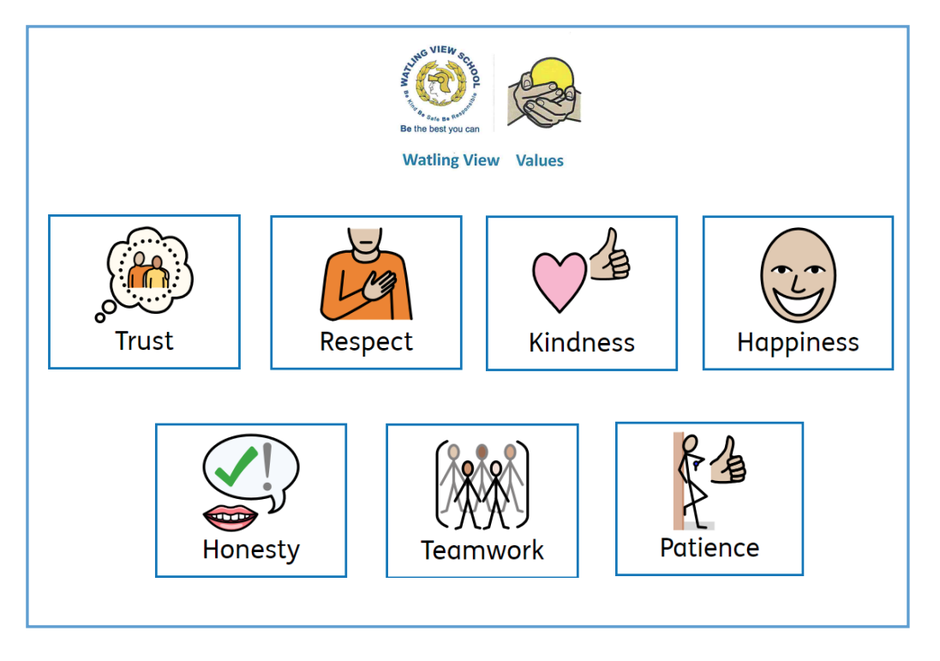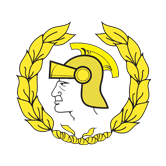Vision & Values


Ethos
We believe our learners should be:
Independent learners who think for themselves
Learners are taught to be as independent as possible through a series of tasks such as going to the hatch to collect lunch, to the office to get the register or to another class to deliver a message. They learn to, or gain experience in, carrying their own bag, hanging up their coat on the right peg, making their own drinks, requesting snacks and changing in preparation for physical activities. These tasks, and many more like them, teach learners to think for themselves as they plan for their activities. Learners are given problems to solve to help them develop their thinking skills. Learners with additional needs develop awareness of their surroundings and gain experiences through their position and interactions in a range of environments.
Learning to develop a positive self image and sense of self
Learners have responsibilities, such as helping another pupil, and are given time to do things for themselves. They are praised and acknowledged for their achievements and given positive feedback that encourages them to learn. They are given time to make choices and decisions and are allowed to express likes and dislikes. They are allowed, and even encouraged, to make mistakes and these are seen as learning opportunities. Through challenging and achievable targets they gain confidence and develop a sense of belief as they try new skills and develop their learning.
Willing and motivated to learn for learning’s sake
Learners are given every opportunity to learn in structured (timetables, routines) and unstructured (special events) situations and are encouraged by enthusiastic staff. They are motivated by engaging, stimulating, practical and enjoyable activities that improve their knowledge and skills in school, the community and at home. Learners are given opportunities to focus on learning experiences that are personalised and meet their learning needs. They are rewarded for their persistence and achievements and are motivated by adults’ constructive feedback.
Creative and flexible in their thought and actions and prepared to take risks in their learning
Learners experience a wide range of learning environments, in school, out in the community and at home, and these challenge their normal routines and expectations. They work with a wider range of people in a greater number of settings as they get older and they are encouraged, taught and experience risk taking and are often given opportunities to learn from their mistakes and be flexible in their actions.
Resilient and self confident
Learners are given confidence by staff who encourage them to express them selves and communicate their feelings using different means of communication (speech, pictures, symbols, gestures, objects of reference). They are given opportunities to explore and encouraged to try again if at first they do not succeed. They are offered a growing number of challenging opportunities as they develop and encouraged to take risks in a variety of safe and secure situations that help them build their confidence. They are taught to take responsibility for themselves, others and their environment.
Willing to accept responsibility and to demonstrate qualities of leadership
Learners are taught and given opportunities to be responsible through a range of curriculum opportunities such as cleaning up or making a drink at snack time, giving home/school book to staff at start of the day, getting equipment out at the start of a lesson, joining the group at circle time and taking on roles and / or class jobs. They are taught to choose right from wrong and take responsibility for their behaviour at all times. They are given opportunities to take the lead during learning time and actively taught to do so through adult modelling and opportunities for repetition and rehearsal. Learners with additional needs are given opportunities to participate in learning by using switches, vocalisations, expressions and to communicate their needs using objects of reference.
Opportunity to work effectively alongside others as a part of a team
Learners are encouraged to participate in groups in a range of activities (subject lessons, play, drama, music, sports, and art). An awareness of self and others is a constant focus in micro communities (small group, friendship circles, whole class, and school). They are given opportunities to experience ‘belonging’ and ‘pride’ through department and class identity, wearing uniform, taking part in games / competitions / group tasks and the celebration of team achievements. At times they interact with different aged groups and are taught to be flexible and responsible. Learners are taught to co-operate, share and turn take when working in pairs or groups. Older learners have opportunities to work with less familiar people off site (college, horse riding, work experience, swimming) and develop team skills in a wider context.
Socially and morally responsible
Learners are taught to take responsibility for themselves, for others, for the school and for the wider community. They are taught to take responsibility for their actions and to accept consequences if their actions hurt others. They are given boundaries (class rules, community code) and guided in keeping to them and are taught to be kind to others. Adults, as role models, show learners how to respect others, property and the community. New experiences in and out of school expose learners to practicing their skills in taking responsibility in a wider arena. Learners are prepared for change through carefully planned interventions and appropriate communication (photo stories, schedules, photos).
Respectful of others as individuals & of different religious beliefs & cultures
Learners enjoy a wide range of religious and cultural experiences and celebrations (curriculum work in RE, PSHE & food tech, assemblies, school celebrations, trips to places of worship & cultural importance, sensory experiences) and encounter the teaching of morals throughout their day. They are taught what is right and what is wrong in many situations. Their trips into the community instil them with a sense of belonging and help them understand we are all different. Learners are taught to respect others.
Compassionate
Learners are taught to be sensitive to other people’s needs and emotions. They learn to share, take turns and show care and respect throughout the school day and this is modelled by staff and re-enforced during class time and assemblies. They are taught to be kind to others and are shown how to do this by staff modelling kind behaviours and the use of photos and appropriate language by way of explanation. Some learners experience moments or periods of compassion.
Emotionally intelligent
Learners are encouraged and given opportunities to try and do things they have not experienced before and to recognise a range of emotions. They are taught to express them selves to the best of their abilities and are even given experiences that they might or not like or enjoy and encouraged to communicate their feelings about these. Adults try to ‘get it right’ for each child and offer opportunities for them to understand the difference between good and bad feelings and choices. By accessing and engaging in a range of emotional experiences learners are given every opportunity to understand their feelings and express themselves.
Fit, happy and healthy
Learners are encouraged to join in with a range of stimulating health related activities as part of their curriculum (PE, swimming, walking) and in their play time (breaks). Achievable and enjoyable activities are offered to challenge each learner and help them develop positive attitudes towards exercise and being fit and healthy. During play time learners are encouraged to participate in physical activities (bike riding, climbing, walking, running, swinging, pushing, pulling), as well as social activities (playing, talking, sharing, turn taking). During snack times and food technology lessons, learners are offered a variety of foods and taught to make choices and try healthy foods. They are given opportunities to work in the garden and become more aware of healthy foods, such as fruit and vegetables. They try planting, growing, harvesting, tasting and eating different fruits and vegetables. Learners are given opportunities to speak freely and to be heard, as well as to make personal choices and express their feelings. They experience different enrichment activities that enable them to enjoy their learning experiences in new and less familiar ways. A ‘Person Centred Approach’ gives each learner the possibility of a unique learning pathway that meets their needs – a wheelchair user may, for example, have much more access to the hydro pool than a learner who exercises freely in the playground. Learners are encouraged to work with a range of visitors to the school (students from local schools, volunteers, parents) and develop relationships with less familiar people.

